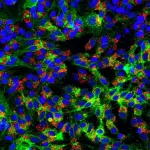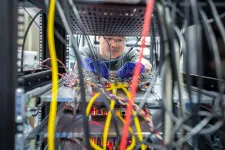Read to succeed -- in math; study shows how reading skill shapes more than just reading
University at Buffalo psychologist identifies a connectivity fingerprint suggesting that the brain's reading network is at work across cognitive domains; 'reading affects everything,' he says
2021-03-11
(Press-News.org) BUFFALO, N.Y. - A University at Buffalo researcher's recent work on dyslexia has unexpectedly produced a startling discovery which clearly demonstrates how the cooperative areas of the brain responsible for reading skill are also at work during apparently unrelated activities, such as multiplication.
Though the division between literacy and math is commonly reflected in the division between the arts and sciences, the findings suggest that reading, writing and arithmetic, the foundational skills informally identified as the three Rs, might actually overlap in ways not previously imagined, let alone experimentally validated.
"These findings floored me," said Christopher McNorgan, PhD, the paper's author and an assistant professor in UB's Department of Psychology. "They elevate the value and importance of literacy by showing how reading proficiency reaches across domains, guiding how we approach other tasks and solve other problems.
"Reading is everything, and saying so is more than an inspirational slogan. It's now a definitive research conclusion."
And it's a conclusion that was not originally part of McNorgan's design. He planned to exclusively explore if it was possible to identify children with dyslexia on the basis of how the brain was wired for reading.
"It seemed plausible given the work I had recently finished, which identified a biomarker for ADHD," said McNorgan, an expert in neuroimaging and computational modeling.
Like that previous study, a novel deep learning approach that makes multiple simultaneous classifications is at the core of McNorgan's current paper, which appears in the journal Frontiers in Computational Neuroscience.
Deep learning networks are ideal for uncovering conditional, non-linear relationships.
Where linear relationships involve one variable directly influencing another, a non-linear relationship can be slippery because changes in one area do not necessarily proportionally influence another area. But what's challenging for traditional methods is easily handled through deep learning.
McNorgan identified dyslexia with 94% accuracy when he finished with his first data set, consisting of functional connectivity from 14 good readers and 14 poor readers engaged in a language task.
But he needed another data set to determine if his findings could be generalized. So McNorgan chose a math study, which relied on a mental multiplication task, and measured functional connectivity from the fMRI information in that second data set.
Functional connectivity, unlike what the name might imply, is a dynamic description of how the brain is virtually wired from moment to moment. Don't think in terms of the physical wires used in a network, but instead of how those wires are used throughout the day. When you're working, your laptop is sending a document to your printer. Later in the day, your laptop might be streaming a movie to your television. How those wires are used depends on whether you're working or relaxing. Functional connectivity changes according to the immediate task.
The brain dynamically rewires itself according to the task all the time. Imagine reading a list of restaurant specials while standing only a few steps away from the menu board nailed to the wall. The visual cortex is working whenever you're looking at something, but because you're reading, the visual cortex works with, or is wired to, at least for the moment, the auditory cortex.
Pointing to one of the items on the board, you accidentally knock it from the wall. When you reach out to catch it, your brain wiring changes. You're no longer reading, but trying to catch a falling object, and your visual cortex now works with the pre-motor cortex to guide your hand.
Different tasks, different wiring; or, as McNorgan explains, different functional networks.
In the two data sets McNorgan used, participants were engaged in different tasks: language and math. Yet in each case, the connectivity fingerprint was the same, and he was able to identify dyslexia with 94% accuracy whether testing against the reading group or the math group.
It was a whim, he said, to see how well his model distinguished good readers from poor readers - or from participants who weren't reading at all. Seeing the accuracy, and the similarity, changed the direction of the paper McNorgan intended.
Yes, he could identify dyslexia. But it became obvious that the brain's wiring for reading was also present for math.
Different task. Same functional networks.
"The brain should be dynamically wiring itself in a way that's specifically relevant to doing math because of the multiplication problem in the second data set, but there's clear evidence of the dynamic configuration of the reading network showing up in the math task," McNorgan says.
He says it's the sort of finding that strengthens the already strong case for supporting literacy.
"These results show that the way our brain is wired for reading is actually influencing how the brain functions for math," he said. "That says your reading skill is going to affect how you tackle problems in other domains, and helps us better understand children with learning difficulties in both reading and math."
As the line between cognitive domains becomes more blurred, McNorgan wonders what other domains the reading network is actually guiding.
"I've looked at two domains which couldn't be farther afield," he said. "If the brain is showing that its wiring for reading is showing up in mental multiplication, what else might it be contributing toward?"
That's an open question, for now, according to McNorgan.
"What I do know because of this research is that an educational emphasis on reading means much more than improving reading skill," he said. "These findings suggest that learning how to read shapes so much more."
INFORMATION:
ELSE PRESS RELEASES FROM THIS DATE:
2021-03-11
Researchers at Princeton have determined how five cellular proteins contribute to an essential step in the life cycle of hepatitis B virus (HBV). The article describing these findings appeared March 11, 2021 in the journal Nature Communications.
Viruses have been with us, shaping our lives, societies and economies for millennia. While some viruses rapidly explode onto the world stage, others smolder in our communities for decades, shattering lives but making few headlines. Hepatitis B virus hasn't caused any nationwide lockdowns or stock market crashes because it is slow to spread from person to person and is rarely immediately fatal. It is nonetheless incredibly damaging because it can establish lifelong chronic infection ...
2021-03-11
RESEARCH TRIANGLE PARK, N.C. -- New Army-funded research could help lay the groundwork for future quantum communication networks and large-scale quantum computers.
Researchers sent entangled qubit states through a communication cable linking one quantum network node to a second node.
Scientists at the Pritzker School of Molecular Engineering at the University of Chicago, funded and managed by the U.S. Army Combat Capability Development, known as DEVCOM, Army Research Laboratory's Center for Distributed Quantum Information, also amplified an entangled state via the same cable first by using the cable to entangle two qubits in each of two nodes, then entangling these qubits further with other qubits in the nodes. The peer-reviewed journal ...
2021-03-11
Atherosclerosis is the underlying condition that causes heart attacks and strokes. Researchers at Radboudumc in the Netherlands have discovered a protein that appears to play an important role in atherosclerosis. The protein is called Prosaposin, and its role in atherosclerosis was sofar unknown. "We identified Prosaposin as a new potential target for the Science Translational Medicine.
Atherosclerosis is caused by cholesterol that builds up in the vessel wall and triggers chronic inflammation. It has been well established that cholesterol lowering drugs help to treat atherosclerosis. Recent research has shown that inhibiting inflammation can also help to prevent heart attacks and ...
2021-03-11
What The Study Did: In this phase 1 study, a single immunization with Ad26.COV2.S (Janssen/Johnson & Johnson) vaccine induced rapid binding and neutralization antibody responses as well as cellular immune responses. Two phase 3 clinical trials are currently underway to determine the efficacy of the Ad26.COV2.S vaccine.
Authors: Dan H. Barouch, M.D., Ph.D., of Beth Israel Deaconess Medical Center in Boston, is the corresponding author.
To access the embargoed study: Visit our For The Media website at this link https://media.jamanetwork.com/
(doi:10.1001/jama.2021.3645)
Editor's Note: Please see the article ...
2021-03-11
Does a warmer climate mean more dry land? For years, researchers projected that drylands -- including deserts, savannas and shrublands -- will expand as the planet warms, but new research from the Harvard John A. Paulson School of Engineering and Applied Sciences (SEAS) challenges those prevailing views.
Previous studies used atmospheric information, including rainfall and temperature, to make projections about future land conditions. The real picture is more complicated than that, said Kaighin McColl, Assistant Professor of Earth and Planetary Sciences and of Environmental Science and Engineering at SEAS and senior author ...
2021-03-11
AMES, Iowa - Parents would never give their children the keys to the car without supervised training and driver's education. An Iowa State University researcher says parents and educators need to take a similar approach before handing children a keyboard to access the digital world.
ISU psychology professor Douglas Gentile worked with the DQ (Digital Intelligence) Institute, an international think tank, to design a framework for digital literacy education. In a commentary, published by the journal Nature Human Behaviour, Gentile and his colleagues outlined how the COVID-19 pandemic has accelerated ...
2021-03-11
What do you do after solving the answer to life, the universe, and everything? If you're mathematicians Drew Sutherland and Andy Booker, you go for the harder problem.
In 2019, Booker, at the University of Bristol, and Sutherland, principal research scientist at MIT, were the first to find the answer to 42. The number has pop culture significance as the fictional answer to "the ultimate question of life, the universe, and everything," as Douglas Adams famously penned in his novel "The Hitchhiker's Guide to the Galaxy." The question that begets 42, at least in the ...
2021-03-11
CHAMPAIGN, Ill. -- Charitable donations account for about 2% of gross domestic product in the U.S., but it's not well-understood whether an event such as a deadly storm inspires increases in charitable giving or simply reallocates a fixed supply of donation dollars that would have otherwise gone to another cause.
A new paper from a team of University of Illinois Urbana-Champaign experts finds that, in the aftermath of catastrophic tornadoes, charitable giving to alleviate an unanticipated event doesn't necessarily crowd out monetary donations to ...
2021-03-11
Millions of people die prematurely every year from diseases and cancer caused by air pollution. The first line of defence against this carnage is ambient air quality standards. Yet, according to researchers from McGill University, over half of the world's population lives without the protection of adequate air quality standards.
Air pollution varies greatly in different parts of the world. But what about the primary weapons against it? To find answers, researchers from McGill University set out to investigate global air quality standards in a study published ...
2021-03-11
The idea was so far-fetched it seemed like science fiction: create an observatory out of a one cubic kilometer block of ice in Antarctica to track ghostly particles called neutrinos that pass through the Earth. But speaking to Benedickt Riedel, global computing manager at the IceCube Neutrino Observatory, it makes perfect sense.
"Constructing a comparable observatory anywhere else would be astronomically expensive," Riedel explained. "Antarctica ice is a great optical material and allows us to sense neutrinos as nowhere else."
Neutrinos are neutral subatomic particles with a mass close to zero that can pass through solid materials at near the speed of light, rarely reacting with normal matter. They were first detected in the 1950s in experiments that operated ...
LAST 30 PRESS RELEASES:
[Press-News.org] Read to succeed -- in math; study shows how reading skill shapes more than just reading
University at Buffalo psychologist identifies a connectivity fingerprint suggesting that the brain's reading network is at work across cognitive domains; 'reading affects everything,' he says



